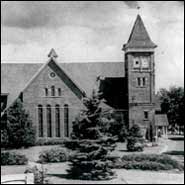|
The greatest difference between Booker T. Washington (1856 -1915) and W. E. B. Du Bois (1868-1963) came over the issue of what would be considered progress for African Americans. Each man believed strongly in the importance of education in uplifting the African American community; Washington was a teacher and the architect of the curriculum at the Normal School for Colored Teachers (now known as Tuskeegee University) and Du Bois was a Harvard educated crusader for civil rights.
Washington, who was a freed slave, believed strongly in the value of work to build up a person's strength and sense of self worth. He worked to put himself through college and was acutely aware of the sacrifices that it took for a newly freed slave, without education or money, to raise his position in the world. He also knew firsthand about the institutional racism that still existed in the south following the Civil War, and he saw how the lynchings and formation of groups like the Ku Klux Klan were threatening to erase whatever small gains that had been gained following the freedom that came with the Union victory.
The solution, according to Washington, was to form vocational facilities where African Americans could learn useful skills. He believed that economic independence was the first step towards true freedom, and that once people had developed an economic foothold they could fight for other liberties as well.
Washington's ideas were seen as appeasement by many African American leaders including W. E. B. Du Bois. Du Bois, who was born in the North after the Civil War and was never exposed to the degree of racism that Washington had seen, came from a background of education and wealth. His childhood was filled with happiness, and despite being the only African American child in the community he never experienced any discrimination. It was not until he went to college in Tennessee, at Fisk University, that he saw the degradation that the African American community faced.
Du Bois felt that Washingtons philosophy of stressing vocational education and surrendering all other civil rights was an act of treachery. This belief was only reinforced by the strong support, both political and economic, that Washington received from white leaders. Washington was selling out the African American community, and was largely admitting that African Americans were, indeed, an inferior race. Du Bois believed in the importance of educating African Americans in all areas, from arts and sciences to vocational training.
The conflict between the ideas came to an apex with the seminal works of the two men; the speech that Washington delivered at the Cotton States and International Exposition in Atlanta (a speech later known as the Atlanta Compromise) in 1895, and Du Bois' work The Souls of Black Folk in 1903. Links to each of these works appear on the pages to follow.
By the early twentieth century the more radical ideas of Du Bois had become widely accepted, and Washington's reputation as a leader of the African American community waned. Both men, however, have had a lasting impact on the debate over race up to the current day, with each man leaving behind a legacy (Washington's Tuskeegee University and Du Bois' NAACP).
| An early photo of Tuskeegee |

|
|



